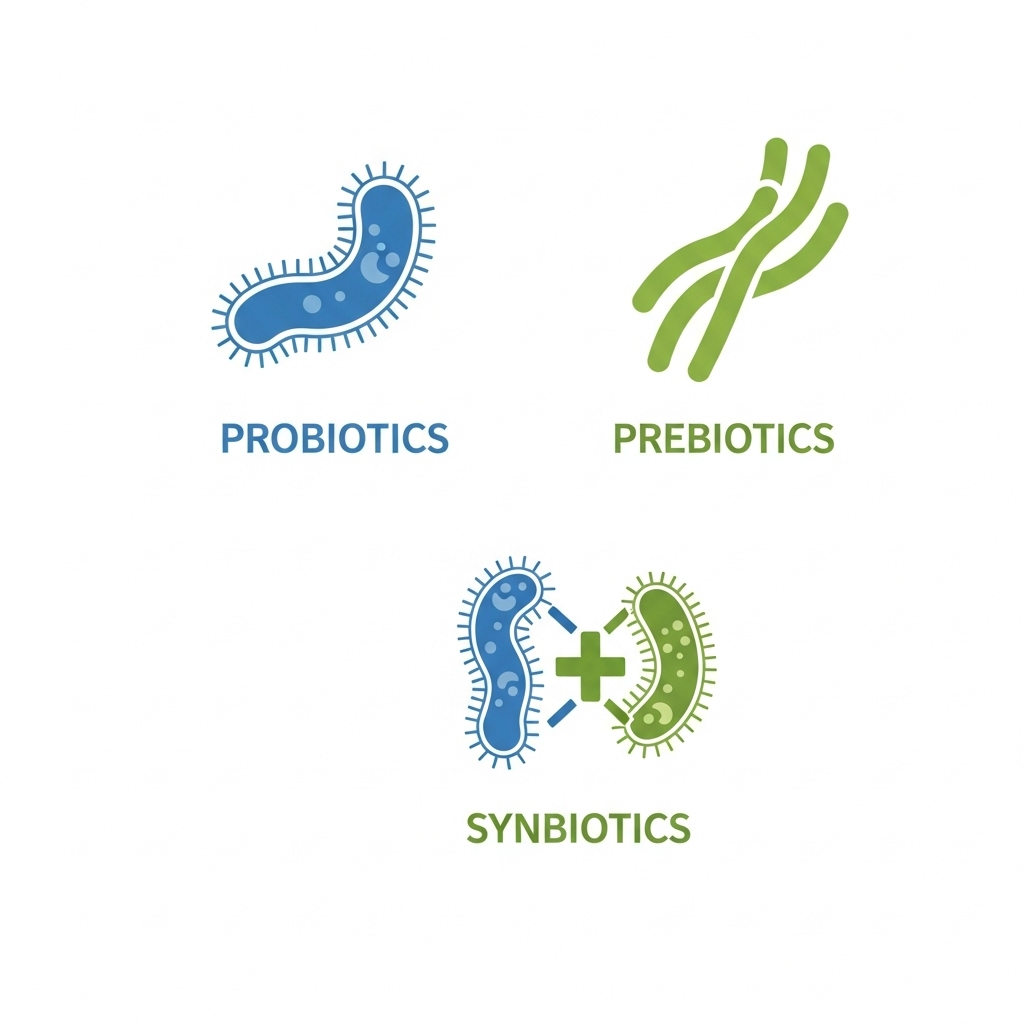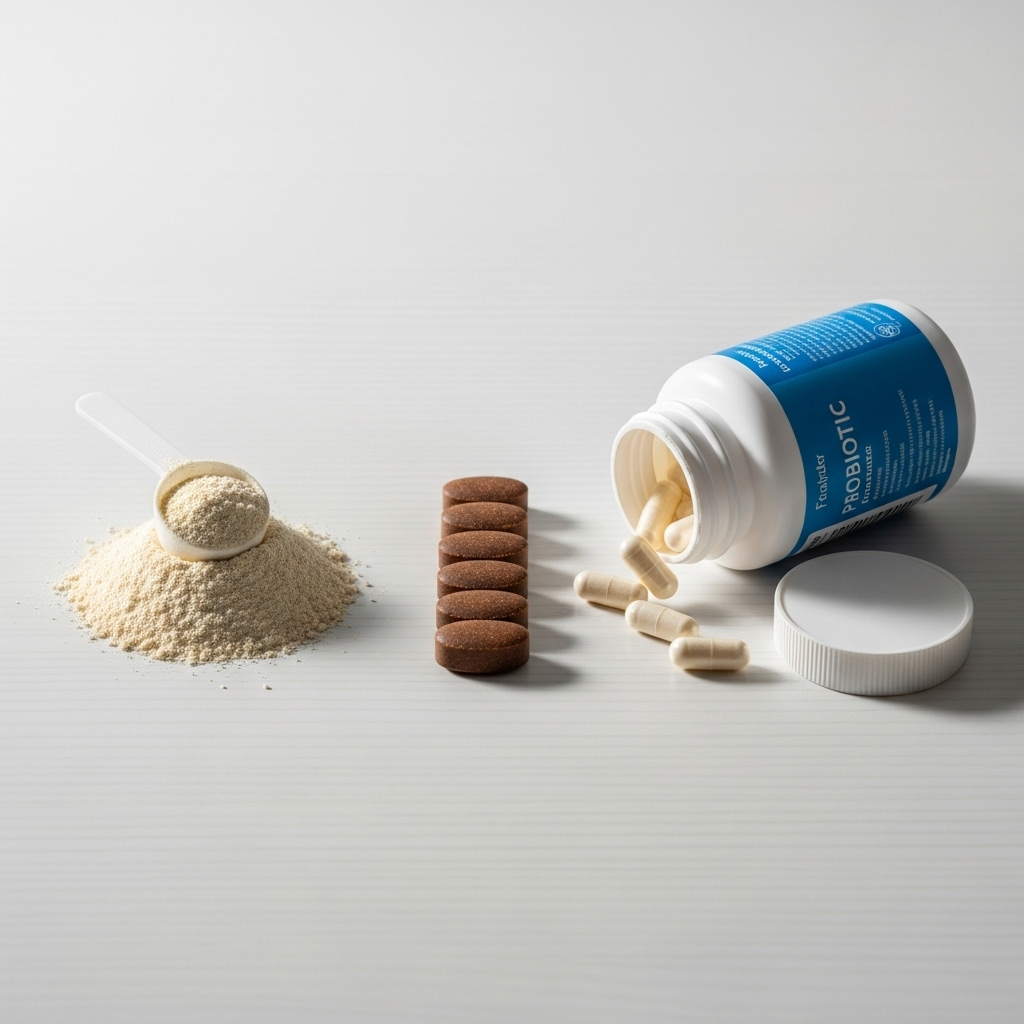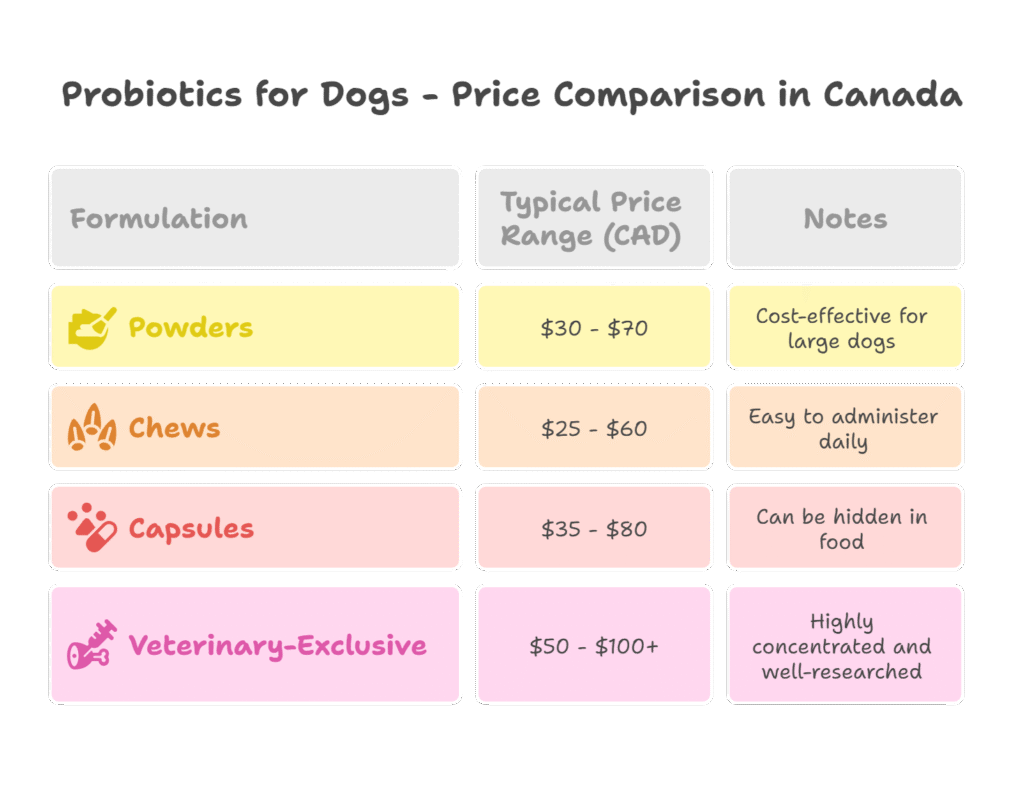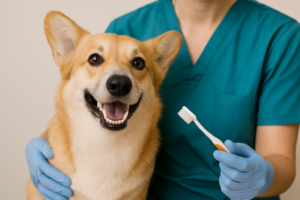Medical Disclaimer: This article is for informational purposes only and does not constitute medical advice. The content is not intended to be a substitute for professional veterinary advice, diagnosis, or treatment. Always seek the advice of your veterinarian with any questions you may have regarding your dog’s medical condition.
Table of Contents
It’s a familiar worry I’ve seen countless times in my Ottawa clinic: your beloved dog is just not themselves. Whether it’s a bout of diarrhoea, incessant scratching, or just a general lack of spark, you know something is off. You want to do everything you can to help, which often leads owners down a rabbit hole of health supplements, including the increasingly popular probiotics for dogs.
Key Takeaways
- What Are Probiotics? Probiotics are live, beneficial bacteria that support a healthy balance in your dog’s digestive tract, known as the microbiome. This balance is crucial not just for digestion but for overall immune function and wellness.
- Scientifically-Backed Strains: Not all probiotics are created equal. Specific strains like Enterococcus faecium, Bifidobacterium animalis, and various Lactobacillus species have scientific evidence supporting their use in canines.
- Benefits Beyond Digestion: While excellent for managing diarrhoea and gas, the right probiotics for dogs can also help with allergies, skin conditions, and even stress-related behaviours by supporting the gut-brain axis.
- How to Choose a Quality Product: Look for a product that lists the specific strains, guarantees a certain number of live bacteria (CFUs), and is from a reputable brand. Always consult your veterinarian before starting any new supplement.
What Are Probiotics and Why Does My Dog Need Them?
You can also read: https://doglifeexpert.com/critical-facts-on-a-raw-food-diet-for-dogs/

As a veterinarian, one of the most fascinating areas of advancing medicine is our understanding of the gut microbiome. It’s not just a digestive tube; it’s a complex ecosystem teeming with trillions of bacteria, both good and bad. The right balance is key to your dog’s health, and that’s where probiotics for dogs come into play.
A Vet’s Perspective on Your Dog’s Gut Health
Think of your dog’s gut as a bustling city. When the “good citizen” bacteria are in charge, the city runs smoothly. Nutrients are absorbed, waste is managed efficiently, and the city’s defence system (the immune system) is strong. But when “bad citizen” bacteria take over, perhaps due to stress, illness, a course of antibiotics, or a poor diet, the city falls into disarray. This can manifest as diarrhoea, gas, bloating, and poor coat quality.
The antibiotics did their job, killing the harmful bacteria, but they also wiped out a significant portion of the beneficial gut flora. In these situations, introducing targeted probiotics for dogs can be like sending in a highly skilled crew to restore order and help the “good citizens” thrive again.
The Difference Between Probiotics, Prebiotics, and Synbiotics

It’s easy to get these terms mixed up, but the distinction is important when choosing a supplement.
- Probiotics: These are the live, beneficial microorganisms themselves. They are the “seeds” of a healthy gut garden. When you give your pet probiotics for dogs, you are directly adding good bacteria to their system.
- Prebiotics: These are essentially food for the good bacteria. They are specific types of fibre (like FOS or inulin) that humans and dogs can’t digest, but that beneficial gut bacteria love to eat. Prebiotics act as the fertiliser for the seeds.
- Synbiotics: This term simply refers to a product that contains both probiotics and prebiotics. This combination of “seeds and fertiliser” can be particularly effective, as it gives the new bacteria the fuel they need to establish themselves and flourish.
The Science-Backed Benefits of Probiotics for Dogs
When clients ask me about probiotics for dogs, they’re usually focused on solving a tummy issue. While they are fantastic for that, the benefits are far more wide-reaching. A healthy gut contributes to a healthy dog, period.
More Than Just a Tummy Tamer
A balanced microbiome does more than just ensure perfect poop. According to The Merck Veterinary Manual, a trusted resource for veterinarians, the applications of probiotics in veterinary medicine are expanding as we learn more about their influence. The benefits are rooted in the gut’s role as the central hub of the immune system.
Here are some of the key, science-supported benefits of using probiotics for dogs:
- Managing Diarrhoea: This is the most well-known benefit. Probiotics can help shorten the duration of acute diarrhoea caused by stress, dietary indiscretion, or antibiotic use.
- Improving Immune Function: A large portion of your dog’s immune system resides in their gut. A healthy microbiome helps modulate the immune response, which can be particularly helpful for dogs with allergies.
- Reducing Allergy Symptoms: By strengthening the gut lining and promoting a healthy immune response, certain probiotic strains can help reduce the severity of skin allergies and atopic dermatitis.
- Supporting Mental Well-being: The “gut-brain axis” is a hot topic in both human and veterinary medicine. An imbalanced gut can contribute to stress and anxiety. Supplementing with specific probiotics for dogs can help promote a calmer disposition.
- Enhancing Nutrient Absorption: A gut populated with beneficial bacteria is more efficient at breaking down food and absorbing vital nutrients, leading to better overall health, energy levels, and coat quality.
7 Powerful Probiotic Strains for Your Dog

The world of probiotics for dogs can feel overwhelming, with dozens of different bacterial names on product labels. However, research has highlighted several specific strains that have demonstrated clear benefits for our canine companions. When you’re choosing a product, these are the names you want to look for.
Enterococcus faecium
This is one of the most researched and commonly used probiotic strains in veterinary medicine. It’s a robust bacterium that is particularly effective at surviving the acidic environment of the stomach to reach the intestines, where it can do its work. Its primary claim to fame is managing diarrhoea. A 2020 study published in the Journal of the American Veterinary Medical Association confirmed its efficacy in helping to resolve uncomplicated diarrhoea in dogs. This makes it a go-to strain for pets experiencing stress-related colitis or antibiotic-associated diarrhoea.
Bifidobacterium animalis
Think of this strain as a key supporter of your dog’s immune system. Bifidobacterium animalis (often listed as B. animalis) is known for its ability to adhere to the intestinal wall and crowd out harmful pathogens. It’s particularly beneficial for puppies in building a strong gut foundation and for senior dogs whose immune systems may be starting to decline. A 2018 review in Veterinary Immunology and Immunopathology highlighted the role of Bifidobacterium species in modulating the canine immune response, making it a powerful ally against allergies and infections. This is a crucial component in any high-quality probiotics for dogs.
Lactobacillus acidophilus
This is probably the most famous probiotic, well-known from human yoghurts and supplements. It’s just as beneficial for our dogs. L. acidophilus helps maintain the proper pH in the small intestine, creating an environment where harmful bacteria struggle to grow. It aids in nutrient absorption and is a foundational strain for general gut health maintenance.
Lactobacillus casei
A close cousin to acidophilus, L. casei offers complementary benefits. It has been shown to have a positive impact on the immune system and can be particularly helpful in managing the digestive upset that comes with stressful situations like boarding, travel, or moving to a new home. Including this in a multi-strain formula of probiotics for dogs provides a broader spectrum of digestive support.
Saccharomyces boulardii
Interestingly, this one isn’t a bacterium; it’s a beneficial yeast. S. boulardii works differently from bacterial probiotics. It’s particularly renowned for its ability to combat antibiotic-associated diarrhoea. Because it’s a yeast, it isn’t affected by antibiotic medications, so it can be given at the same time to protect the gut flora. If your vet has prescribed antibiotics, ask them if adding this specific probiotic is a good idea.
Bifidobacterium longum
This strain is gaining attention for its role in the gut-brain axis. Research has suggested that B. longum can help reduce anxiety-related behaviours in dogs. While not a cure for anxiety, including it in your dog’s wellness plan, alongside training and other therapies, could offer some calming support from the inside out. It’s a fantastic addition to a comprehensive blend of probiotics for dogs.
Lactobacillus plantarum
Found in fermented foods, L. plantarum is another immune-boosting powerhouse. It helps to reinforce the gut lining, a critical function for preventing a condition known as “leaky gut,” where particles can escape the intestine and trigger an inflammatory response. A 2017 study in the journal Beneficial Microbes demonstrated that a supplement containing various Lactobacillus species improved the gut health and immune markers in dogs, underscoring the value of these strains.
How to Choose the Best Probiotic Supplement for Your Dog
Navigating the pet store aisle can be confusing. With so many products screaming for your attention, how do you choose effective and safe probiotics for dogs? It comes down to reading the label carefully and knowing what to look for.
A 5-Minute “At-Home Checklist” for Choosing a Probiotic

Before you buy, run through this quick checklist. A good product should tick most, if not all, of these boxes.
- ✔️ Are Specific Strains Listed? Avoid products that just say “probiotics” or “lactic acid bacteria.” You want to see the full names of the strains, like Enterococcus faecium or Bifidobacterium animalis.
- ✔️ Is There a Guaranteed Analysis (CFU Count)? CFU stands for Colony-Forming Units, which is the measure of live, active bacteria. Look for a product that guarantees a minimum number of CFUs (typically in the billions) at the time of expiration, not just at the time of manufacture.
- ✔️ Does It Include Prebiotics? Look for ingredients like FOS (fructooligosaccharides), inulin, or chicory root. A synbiotic product containing botpre-o and probiotics can offer more comprehensive support for your dog’s gut health.
- ✔️ Is It Formulated for Dogs? Never give your dog human probiotics. Dogs have a different gut environment and different beneficial flora. A product made specifically for dogs will contain the right strains at the right dosage.
- ✔️ Is the Brand Reputable? Look for brands that invest in clinical studies or have their products tested by third-party labs. A quick search online for reviews from veterinary professionals can be very telling. As a rule of thumb, I often refer to the principles outlined in veterinary texts like Blackwell’s Five-Minute Veterinary Consult: Canine and Feline, which emphasise using products with proven efficacy and quality control.
Typical Canadian Costs for Canine Probiotics
The price of probiotics for dogs can vary widely based on the brand, formulation, and quantity. Here’s a general idea of what you can expect to pay in Canada to help you budget.

People Also Ask: Your Top 4 Questions About Probiotics for Dogs
1. Can I give my dog human probiotics?
It’s generally not recommended. While the strains might sound similar, the concentration and specific bacterial subtypes are formulated for the human gut, which has a different pH and microbial makeup than a dog’s. The best probiotics for dogs are those specifically studied and designed for canine physiology.
2. How long does it take for probiotics to work in dogs?
This depends on the reason you’re using them. For acute issues like stress-induced diarrhoea, you might see an improvement within a few days. For more chronic conditions like allergies or immune support, it can take four to eight weeks of consistent daily use to see a noticeable difference as the microbiome rebalances.
3. Are there any side effects of probiotics for dogs?
Side effects are rare and usually mild. When first starting probiotics for dogs, some pets might experience a temporary increase in gas or a slight change in stool consistency. This “adjustment period” usually resolves within a week. Starting with half the recommended dose for a few days can help minimise this.
4. Do all dogs need a daily probiotic?
Not necessarily. A healthy adult dog on a high-quality, balanced diet may not need a daily probiotic. However, they can be highly beneficial for dogs with a history of digestive sensitivity, those prone to stress, pets with allergies, or during and after antibiotic use. It’s a conversation worth having with your vet.
A Final Word from Your Vet
In the journey of pet parenthood, it’s natural to seek out every tool that can enhance your dog’s health and happiness. The world of probiotics for dogs is a genuinely exciting one, offering a scientifically backed way to support their well-being from the inside out. By focusing on proven strains and choosing high-quality products, you move beyond guesswork and make an informed decision that can profoundly impact your dog’s digestive health, immune resilience, and even their mood. Remember, this is a partnership between you, your dog, and your veterinary team. Together, you can build a foundation of gut health that will support your best friend for years to come.





Pingback: Canine Obesity: 5 Devastating Risks & Your 2025 Action Plan